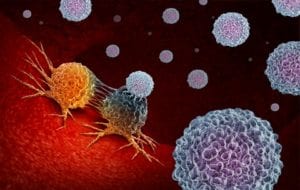PARP Inhibitors Could Enhance Immunotherapy Response in Mesothelioma
 A new study suggests that drugs known as PARP inhibitors may enhance immunotherapy response in mesothelioma patients.
A new study suggests that drugs known as PARP inhibitors may enhance immunotherapy response in mesothelioma patients.
According to a report published in the Journal of Clinical Investigations, PARP inhibitors worked especially well in cancers with mutations in their DNA repair genes.
Some malignant mesothelioma patients have mutated DNA repair genes. In these patients, a PARP inhibitor may modify immunotherapy response, making drugs like Keytruda work better.
How PARP Impacts Immunotherapy Response
PARP stands for poly (ADP-ribose) polymerase. It represents a family of proteins involved in a number of cellular processes, including DNA repair. PARP is also involved in apoptosis, or programmed cell death. Olaparib (Lynparza) is an example of a PARP inhibitor.
PARP inhibitors attack tumors that already have defective DNA repair mechanisms. Some cases of pleural mesothelioma have defects on DNA repair genes such as BRCA or ERCC1.
PARP inhibitors cause the DNA damage to accumulate, impacting immunotherapy response. The new research showed that the accumulated DNA damage could attract more immune cells to the tumor. As more immune system cells collect in the tumor, the immunotherapy response gets stronger.
“The findings of this study substantially change our understanding of how PARP inhibitors work,” says lead author Chris Lord with The Institute of Cancer Research. “We now know that they not only kill tumors by damaging their DNA, but also by attracting immune cells to attack them–acting as a sort of double-pronged attack.”
Immunotherapy response in patients with ERCC1-deficient malignant mesothelioma could be especially strong. The lung cancer study showed the biggest response among patients with this mutation.
Modifying Immunotherapy Response in Lung Cancer
Immunotherapy drugs like Keytruda (pembrolizumab) work by making it harder for mesothelioma cells to hide from the immune system. Immunotherapy response is a top focus for mesothelioma researchers around the world.
Recently, researchers in New York explored the immunotherapy response in people who received the medicine directly into the space around the lungs. Intrapleural immunotherapy may be a more effective delivery method for pleural mesothelioma patients, in particular.
Right now, only 10 to 20 percent of cancer patients respond to immunotherapy. The new research suggests that PARP inhibitors could improve those odds for mesothelioma patients and others battling cancer.
Sources:
Chabanon RM, Muirhead G, Krastev DB, et al. PARP inhibition enhances tumor cell-intrinsic immunity in ERCC1-deficient non-small cell lung cancer. The Journal of Clinical Investigation. 2018. Doi: 10.1172/JCI123319
Precision drugs could unmask cancers to the immune system and boost the effects of immunotherapy [news release]. The Institute of Cancer Research. https://www.icr.ac.uk/news-archive/precision-drugs-could-unmask-cancers-to-the-immune-system-and-boost-the-effects-of-immunotherapy. Accessed March 11, 2019.
Murthy, V, et al, “Intrapleural Immunotherapy: An Update on Emerging Treatment Strategies for Pleural Malignancy”, February 27, 2019, https://onlinelibrary.wiley.com/doi/abs/10.1111/crj.13010





